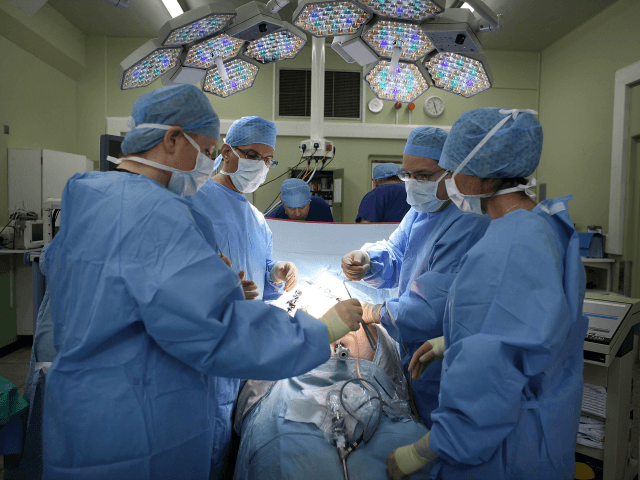(AFP) – In a country where Gay Pride parades require massive security and almost half the citizens think homosexuality is a disease, Serbia is drawing patients from around the world seeking sex change operations to become men.
Offering experts in the field for a fraction of the cost in western Europe and America, Belgrade has become a surprising centre for the complex gender reassignment surgery.
One Italian patient began the transition to become a man 14 years ago and visited Belgium, Britain and Germany looking for the best clinic to complete the procedure.
In the end the 38-year-old anaesthetist chose the Belgrade Centre for Genital Reconstructive Surgery, led by Miroslav Djordjevic, a professor of urology and surgery in the Serbian capital.
“I did a lot of research and contacted many centres and I found that almost everyone was a student of Professor Djordjevic, so I wanted to go to the source of this knowledge,” said the bearded and softly-spoken patient, speaking to AFP a few days after surgery.
He asked to be identified only by the initials A.T.
Djordjevic operates on about 100 international sex change patients each year from countries including Japan, Brazil, South Africa, Australia and the United States. Another 20 or so come from around the former Yugoslavia.
Eighty-five percent of his patients are seeking female-to-male operations, a rarer and more complicated procedure than the reverse.
– Yugoslav pioneers –
For general healthcare Serbia is not widely considered a medical tourism destination, although it does draw some foreigners seeking cheap dentistry
Take, for example, gallstone treatment in Serbia, which “is five times cheaper than in Germany, but nobody comes here for gallstone treatment,” said 51-year-old Djordjevic.
He said patients come to his centre, which opened in 2006, because it’s one of fewer than 20 around the world that can perform the full female-to-male surgery — and it’s unique because “we perform everything in one stage”.
“We do, at the same stage, the removal of the breasts, removal of female internal genitalia… and then we finish our surgery with the creation of a neophallus,” he explained.
This medical speciality started in Serbia in the late 1980s under Djordjevic’s mentor Sava Perovic, a surgeon who pioneered developments in treatment for transgenders.
Another centre in his name, the Sava Perovic Foundation, also performs female-to-male sex changes in Belgrade.
Media-savvy Djordjevic denies that value-for-money is the main reason for Serbia’s popularity, although A.T. paid 15,000 euros ($16,000) in Serbia for surgery that would have cost 60,000 euros in Britain.
The Italian patient said he could have had his operation for free at home but he believed the surgeons there lacked enough experience.
David Ralph, a London-based consultant urologist who specialises in penile construction, said lower hospital costs rather than surgical expenses appeared to be what drove down prices in Serbia.
“At the end of the day the patients get the same,” Ralph told AFP, although he said he preferred to do female-to-male surgery in a series of smaller operations to reduce the chance of complications.
In any case the pre-surgical procedure is lengthy: a patient should undergo a thorough psychiatric evaluation and hormone treatment totalling up to two years.
– ‘Violence, bullying, rejection’ –
Serbia’s success in this special strand of medical tourism is incongruous with the widespread attitudes towards gays and transgenders in the patriarchal country of seven million people.
At Belgrade’s Gay Pride march in 2010, hardline nationalists attacked participants and clashed with police, wounding 150 people and prompting officials to ban the parade for the next three years.
Thousands of riot police are now deployed for the annual event and the city centre is locked down.
A UN-backed survey on discrimination in late 2013 showed that 49 percent of Serbians believed homosexuality was a disease that should be treated.
Transgenders face even greater stigma and “suffer a tremendous amount of violence, bullying, rejection” from a young age, according to activist Milan Djuric, who also goes by the name of Agatha and works for a local NGO, Gayten-LGBT.
Attacks reported last year included a couple beaten in a southern Serbia cafe because one of them was transgender, and a transgender woman who was attacked on a public bus in Belgrade.
In a milestone move, the government agreed in 2012 to bear two-thirds of the cost for its own citizens’ sex change operations.
“But it doesn’t solve a whole array of other issues of concern,” said Djuric, who is campaigning for a gender identity law to help transgender people, particularly in changing their personal documents.
Italian A.T. said he was unaware of the level of prejudice that existed across Serbia, but expressed relief at finding somewhere to finish his operation successfully.
“It is relaxing to be finally at the end of the transformation,” he said.

COMMENTS
Please let us know if you're having issues with commenting.